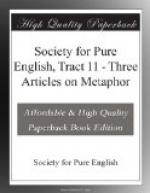Then we are told that some of Mr. George’s feats ’seem to partake of the nature of legerdemain’. ’He sways a popular assembly by waves of almost Hebraic emotion.’ ’No man has ever had his ear closer to the ground and listened more attentively to the tramp of the oncoming multitudes.’ He ‘held Great Britain’s end up’ at the International conference. A ‘magnificent tribute was paid to him by Earl Balfour’ but it ‘did not put him alone on a pinnacle’. And then we read of the whirligig of time, of ’clouds of misunderstanding which point to the coming of a storm’; of how ’foreign nations suddenly became aware that a new star had swum into the world’s ken’; of how ’the situation of this country is perilous with so much Bolshevik gunpowder moving about’, and how ’it has required a strong heart and a clear head to keep the nation from falling either into the sloughs of despond or the fires of revolution’.
Some of these are metaphors that were excellent in their first use and original context; but they lose their excellence if repeated in any context where they have not been discovered by the emotion of the writer but are used by him to make a commonplace appear passionate. Then they seem an unfortunate legacy from poetry to prose; and it is a fact, I think, that our prose now suffers from the richness of our past poetry. Even the prose writers of the Romantic movement regarded prose as the poor relation of poetry; they did not see that prose has its own reasons for existing, its own state of being and its own beauties. They had the habit of writing about Shakespeare in Shakespeare’s own manner, which, in later plays such as Antony and Cleopatra, is often a fading of one metaphor into another so fast that the reader’s or listener’s mind cannot keep pace with it:
O sovereign mistress
of true melancholy,
The poisonous damp of
night disponge upon me,
That life, a very rebel
to my will,
May hang no longer on
me: throw my heart
Against the flint and
hardness of my fault;
Which, being dried with
grief, will break to powder.
And finish all foul
thoughts.
The metaphors here, though instinctive rather than habitual, are excessive even for the dying speech of Enobarbus. The style is the worst model for prose, yet it has persisted as a mere habit in the prose of writers who fear to be prosaic and who are prevented by that habit from saying even what they have to say.
The principles of composition, whether verse or prose, are based on the fact that the unit of language is not the word, or even the phrase, but the sentence. From this it follows that every word and every phrase gets its meaning from the sentence in which it occurs; and so that words and phrases should be used freshly on each occasion and, as it were, recharged with meaning by the aptness of their use. Every sentence should, like a piece of music, establish its own relation




